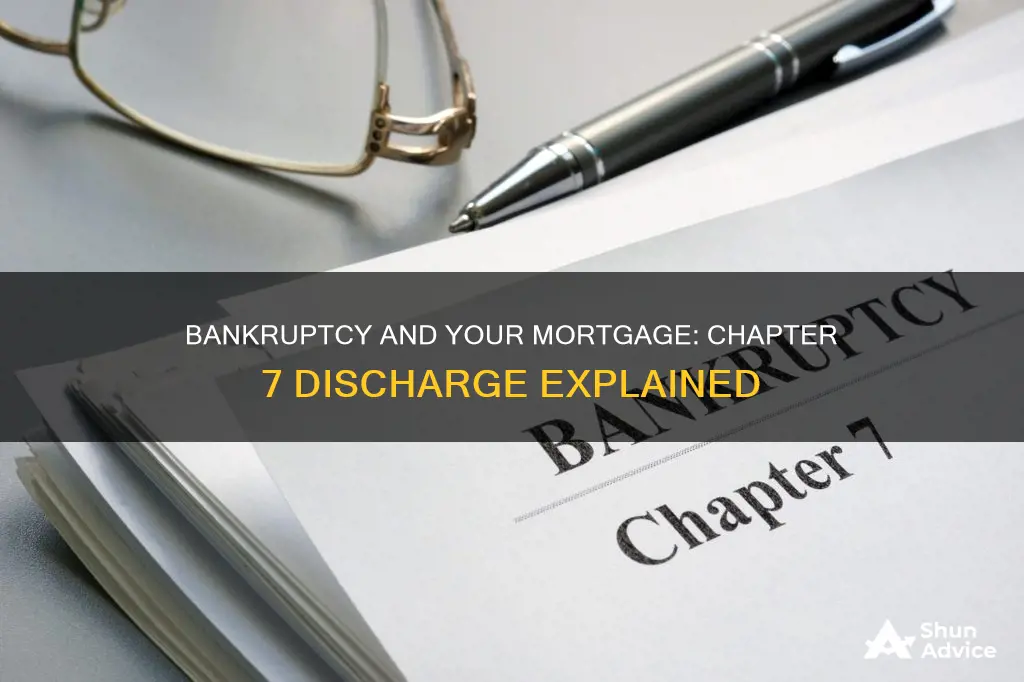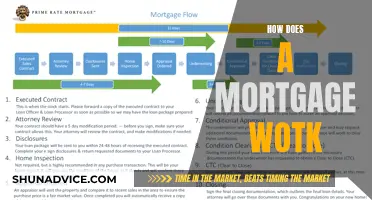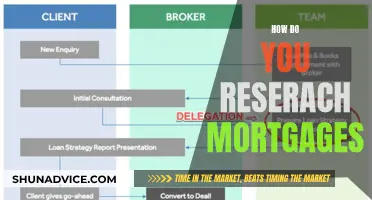
Bankruptcy is a significant decision that can have a major impact on your finances, assets, and credit. Chapter 7 bankruptcy, also known as liquidation bankruptcy, involves selling off non-exempt assets to pay creditors. While it can reduce your debt-to-income ratio by cancelling portions of your debt, it stays on your credit report for up to ten years, making it challenging to get approved for a new mortgage during this time. A Chapter 7 bankruptcy discharge releases you from personal liability for certain debts, but it doesn't eliminate mortgage liens, and you're still responsible for paying any remaining debt. Understanding the implications of Chapter 7 bankruptcy on your mortgage is crucial before making any decisions.
What You'll Learn

Chapter 7 bankruptcy does not eliminate the mortgage lien
When you take out a mortgage loan, the lender creates a lien on the property by taking the home as collateral to guarantee payment of the loan. This means that if you default on your mortgage, the lender can enforce its lien by foreclosing on the house.
A lien is a charge upon specific property to secure payment of a debt. In the case of a mortgage, the house is the collateral that secures the debt. This means that even if Chapter 7 bankruptcy wipes out your responsibility to repay the loan, the lien remains in place. As long as the lien is in place, the creditor can recover the property. Therefore, if you fall behind on your mortgage payments after filing for Chapter 7 bankruptcy, the lender can still foreclose on your house.
It is important to note that lien stripping, or removing a lien, is not available in Chapter 7 bankruptcy. This means that all liens will remain on your property, and you will need to continue paying all loans as agreed to keep your house. If you are unable to keep up with your mortgage payments, you may want to consider filing for Chapter 13 bankruptcy, which offers lien stripping for certain types of liens.
In summary, while Chapter 7 bankruptcy can provide relief from overwhelming debt, it is not a way to get rid of a mortgage lien. If you are considering bankruptcy and are concerned about keeping your home, it is important to seek legal advice and explore all available options.
Finding the Best Mortgage: A Shopper's Guide
You may want to see also

You can still get a mortgage after Chapter 7 bankruptcy
While bankruptcy may be a cause of financial difficulty, it is also often the result of serious financial challenges, such as lost income or medical debt. It is possible to get a mortgage after bankruptcy, but it is important to be aware of the challenges and waiting periods that may be involved.
Chapter 7 bankruptcy, also known as total bankruptcy, involves the liquidation of assets to pay off creditors. This type of bankruptcy stays on your credit report for up to 10 years and can affect your ability to get a mortgage in the future. However, it is still possible to obtain a mortgage after Chapter 7 bankruptcy. The waiting period for a conventional mortgage after Chapter 7 bankruptcy is typically between one and four years. During this time, it is important to focus on rebuilding your credit and finances. This includes getting a down payment, emergency savings, reliable income, and a track record of paying bills on time.
There are also other options available if you cannot wait for the full waiting period. For example, there are limited-availability programs that can allow a Chapter 7 debtor to qualify for an FHA loan in as little as one year if extreme circumstances outside your control, such as the death of a spouse or divorce, led to your financial issues. Additionally, you may be able to get a non-qualified (non-QM) mortgage immediately after bankruptcy if you can afford the large down payment and high-interest rates typically required. However, these loans tend to be more expensive and are considered risky for borrowers.
It is important to note that lenders will have more stringent guidelines for loan approval after a Chapter 7 bankruptcy. They will want to ensure that you are set up for success and will scrutinize your documentation thoroughly. Be prepared to answer all questions and provide documentation related to your income and assets, such as W-2s, 1099s, and financial statements.
While getting a mortgage after Chapter 7 bankruptcy can be challenging, it is not impossible. By taking the necessary steps to rebuild your credit and finances and being aware of the waiting periods and lender requirements, you can increase your chances of obtaining a mortgage in the future.
Deed of Trust vs Mortgage: What's the Difference?
You may want to see also

Bankruptcy discharges vary depending on the case type
The timing of the discharge depends on the chapter under which the case is filed. In a Chapter 7 case, the court usually grants the discharge promptly on expiration of the time fixed for filing a complaint objecting to the discharge and the time fixed for filing a motion to dismiss the case for substantial abuse. This typically occurs about four months after the debtor files the petition with the clerk of the bankruptcy court. Chapter 7 is also known as total bankruptcy, and in these cases, many of the debtor's assets will be sold off to pay their creditors.
In individual Chapter 11 cases and in cases under Chapter 12 (adjustment of debts of a family farmer or fisherman) and Chapter 13 (adjustment of debts of an individual with regular income), the court generally grants the discharge as soon as practicable after the debtor completes all payments under the plan. Since a Chapter 12 or Chapter 13 plan may provide for payments to be made over three to five years, the discharge typically occurs about four years after the date of the petition. Chapter 13 cases can include an agreement about your mortgage, and lien stripping is a benefit of Chapter 13 that is not available in Chapter 7.
Not all debts are discharged. The debts discharged vary under each chapter of the Bankruptcy Code. Section 523(a) of the Code specifically excepts various categories of debts from the discharge granted to individual debtors. Therefore, the debtor must still repay those debts after bankruptcy. Congress has determined that these types of debts are not dischargeable for public policy reasons. There are 19 categories of debt excepted from discharge under Chapters 7, 11, and 12. A more limited list of exceptions applies to cases under Chapter 13.
Wells Fargo Mortgage Agent: Money-Making Strategies
You may want to see also

Chapter 7 bankruptcy stays on your credit report for up to 10 years
Chapter 7 bankruptcy, also known as "liquidation" bankruptcy, stays on your credit report for up to 10 years. This type of bankruptcy involves selling non-essential assets to pay off debts. While Chapter 7 bankruptcy can help you erase debt and get a financial clean slate, it has a significant impact on your credit score and your ability to borrow money or access credit in the future.
The 10-year period begins on the date of filing for bankruptcy and it applies to both the public records section of your credit report and the account information section, as creditors may report accounts included in the bankruptcy. During this time, your credit score will be lower, and it may affect your ability to obtain a mortgage or other loans. However, it is possible to take steps to improve your credit score and rebuild your financial situation even after filing for bankruptcy.
One way to improve your credit score is to ensure timely bill payments. On-time payments are a major factor in credit reporting, and maintaining a good payment history can help demonstrate financial responsibility. Additionally, managing your credit utilization can positively impact your credit score. Keeping your credit card balances under 30% of your total credit limit, or ideally between 10-20%, can reflect well on your credit report.
Another option to enhance your credit score is to become an authorized user on someone else's credit card. This approach allows you to benefit from the good credit history of a close friend or family member. However, it is important to exercise caution and maintain good financial habits to avoid putting their credit score at risk.
While Chapter 7 bankruptcy stays on your credit report for up to 10 years, it is important to note that it does not eliminate mortgage liens. Even though the bankruptcy discharge releases you from personal liability for certain debts, valid liens, such as a mortgage lien, may remain. Therefore, if you want to keep your home, it is crucial to stay current on your mortgage payments and protect your home equity with a bankruptcy exemption.
Removing the Deceased's Name from a Mortgage
You may want to see also

Chapter 7 bankruptcy involves selling off non-exempt assets
Chapter 7 bankruptcy is a legal process that involves the liquidation of a debtor's non-exempt assets. This means that a court-appointed trustee will sell off any assets that are not protected by exemptions, and the proceeds will be used to pay off creditors. The process allows debtors to discharge unsecured debts, such as credit card debt and medical bills, and get a fresh financial start. However, certain debts, like student loans and tax obligations, are typically not dischargeable.
When an individual files for Chapter 7 bankruptcy, their existing property will be deemed either exempt or non-exempt. Exempt property refers to assets that are protected from liquidation and can be kept by the debtor throughout the bankruptcy process. These include essential assets and personal belongings, such as a primary residence, motor vehicle, clothing, and basic household furnishings. The specific exemptions vary depending on state laws and federal legislation.
Non-exempt assets, on the other hand, are subject to liquidation. These are assets that are not protected by exemptions and can be sold by the trustee to satisfy creditors. Examples of non-exempt assets include expensive musical instruments (unless the debtor is a professional musician), collections of stamps, coins, and other valuable items. Public benefits, such as welfare and unemployment compensation, may also be considered non-exempt assets.
It is important to note that Chapter 7 bankruptcy has a significant impact on mortgages. While it can eliminate mortgage debt, it does not eliminate the mortgage lien. This means that if an individual wants to keep their home, they must stay current on their mortgage payments and protect their home equity with a homestead exemption or other available exemptions. Failure to do so may result in foreclosure.
Chapter 7 bankruptcy stays on an individual's credit report for up to 10 years and has a negative impact on their creditworthiness. However, it is possible to rebuild credit and eventually qualify for a mortgage after bankruptcy. The waiting period for a conventional loan after Chapter 7 bankruptcy is typically four years, but it may vary depending on the lender and the individual's financial situation.
Building Bridges: Mortgage Advisers and Estate Agents
You may want to see also
Frequently asked questions
Chapter 7 bankruptcy, also known as "'liquidation' bankruptcy", involves selling off non-exempt assets to pay off creditors. This type of bankruptcy is for individuals who lack sufficient income to repay their debts.
Chapter 7 bankruptcy discharges your obligation to repay your mortgage loan, but it does not eliminate the lien on your property. This means that if you fall behind on your mortgage payments, the lender can still enforce the lien by foreclosing on your house.
Chapter 13 bankruptcy offers more flexibility in dealing with your mortgage. It allows for lien stripping, which is not available in Chapter 7. Chapter 13 also has a shorter waiting period for obtaining a new mortgage, and you may be eligible for an FHA or VA loan as soon as one year after filing.
Bankruptcy can have a negative impact on your credit score and make it more challenging to obtain a new mortgage. Chapter 7 bankruptcy can stay on your credit report for up to ten years, and it typically takes time to rebuild your credit enough to qualify for a new mortgage. However, with consistent effort to rebuild your credit, it is possible to obtain a mortgage after the waiting period.
Bankruptcy is a significant decision that can impact various aspects of your financial life, so it's important to understand how it will affect you specifically. Consulting with a bankruptcy attorney is essential to understand your options, as specifics vary by state.







